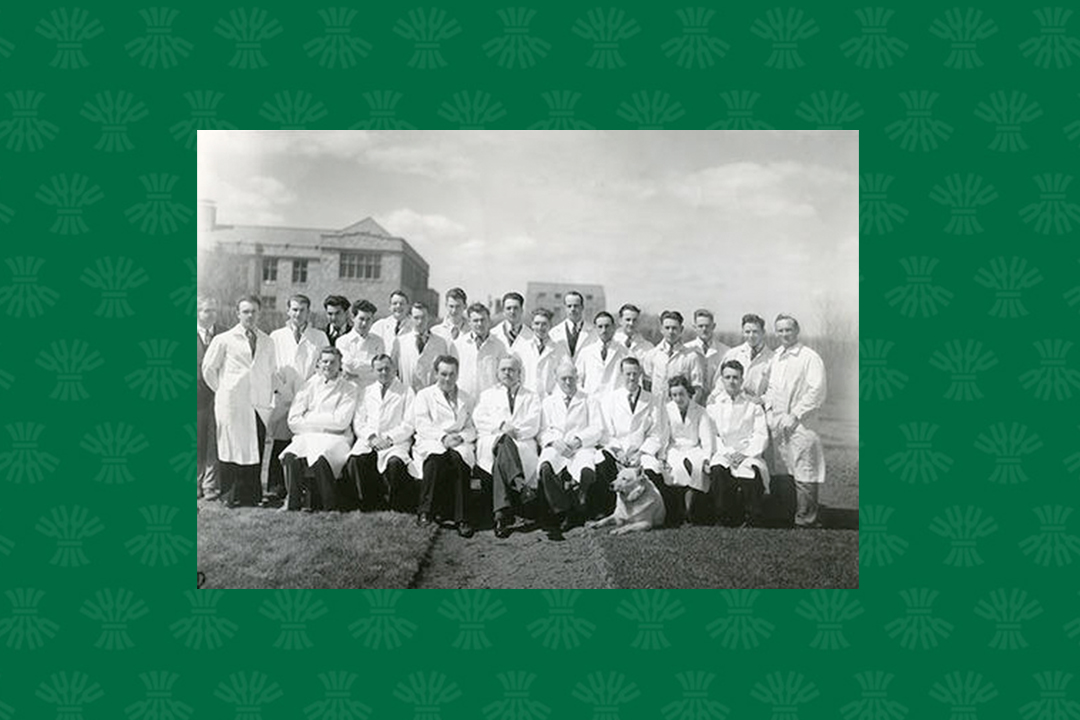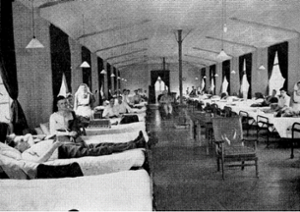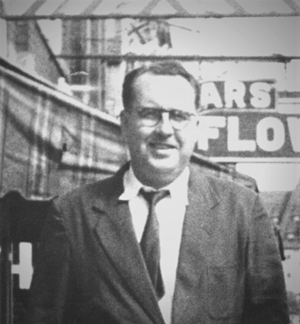
The Pride of Saskatchewan: Dr. James M. Campbell (MED’31)
One Saskatchewan alumnus applied his medical expertise to serve overseas during the Second World War.
By DEREK TIESSENPhysicians have always held a special place in the public eye; admired for their live-saving skills and unrelenting selflessness. From its humble beginnings in 1926 as the School of Medical Sciences, through the recent graduating Class of 2021, alumni from the College of Medicine at the University of Saskatchewan have consistently upheld and often exceeded this high standard. Perhaps at no other point in history are these qualities tested more than when a nation is at conflict. With bloodshed all around them, medical staff often put themselves at great peril to save the lives of armed forces members, sometimes on both sides of the conflict, and the civilians caught in the middle.
Thank you to the numerous College of Medicine alumni that have served in the military, for your dedication to public health and devotion to a better tomorrow. We are grateful for your service.
During the Second World War, Dr. James M. Campbell (MED’31) was stationed at the No. 8 General Hospital in England, one of the busiest military hospitals in Great Britain.
Between 1941-1946, the Royal Canadian Army Medical Corps (RCAMC) operated 20 general hospitals throughout Europe. Although hospitals could accommodate anywhere from 600 to 1200 injured soldiers, the facilities were intended to be mobile units, strategically positioned behind Canadian and ally advances.

Several School of Medical Sciences graduates, including Campbell, were called upon to serve in Canadian war hospitals and put their medical training to the test. Despite being under the threat of German bombing campaigns, the graduates persevered in their own battle to save lives.
The No. 8 General Hospital was the only all-Saskatchewan unit and quickly became a source of inspiration for medical students at the University of Saskatchewan (USask). While other general hospitals were able to make early supply arrangements with Canadian charities, No. 8 had been hastily deployed from Canada without an opportunity to make such arrangements. In the summer of 1942, USask students sent $350 to the No. 8 General Hospital, who by this time had become one of the busiest Canadian military hospitals stationed in Great Britain.
The following are excerpts from thank you letters sent by staff at the No. 8 General Hospital, addressed to USask President W.P. Thompson:
“Being a Saskatchewan unit, many Saskatchewan university graduates are members of the staff. Among them are Dorothy Riches (Principal Matron), Lt. Col. Bennett, and Maj J.M. Campbell, who was captain of the rugby team for four years and also a member of the medical staff here. Several other doctors and nursing sisters are Saskatchewan graduates.” Col. Gordon Young, D.S.L., Officer Commanding No.8 General Hospital
“May I in this way extend the students of the university our very sincere thanks for the generous gift you made our unit this summer. It is, I assure you, greatly appreciated and makes so much difference in the way we can take care of our patients…our Colonel Major James M. Campbell and myself are planning a few extra comforts for Christmas for our own boys of the unit. We hope to be able to furnish a new heating plate to one of the wards too-so you may see your generosity has helped in many ways as we are one of the busiest Canadian general hospitals over here and an entirely Saskatchewan unit, we do most heartedly appreciate your help and support.” Ms. Dorothy Riches, Principal Matron, No. 8 General Hospital
The Saskatchewan hospital faced their first major test of the war on August 19, 1942, when allied forces – led by the Canadian military – attacked the German-occupied port of Dieppe in northern France. Within 10 hours of the raid being launched, 3,623 of the 6,000 Canadian soldiers had either been killed, wounded or captured. Casualties were evacuated back to Great Britain where Canadian general hospitals, including No. 8, played a key role in tending to the wounded.

When the allied forces advanced towards Germany, the No.8 General Hospital advanced along with it. Before Germany’s surrender in May 1945, the No.8 General Hospital had been transported from Aldershot (England) to Antwerp (Belgium) and eventually to Sint-Michielsgestel (Netherlands).
Shortly after combat operations in Europe had ceased, the Canadian military quickly began consolidating medical facilities. The No.8 General Hospital was officially disbanded in May 1945.
While some physicians and nurses returned to Canada, others stayed in Europe to support the remaining Canadian hospitals. Over the course of its three-year deployment, the No. 8 General Hospital had saved countless lives and made the citizens of Saskatchewan – and university students – incredibly proud.
After the war, Campbell returned to Saskatoon to complete his RCPSC certification in urology before setting up his own private practice. During his post-war career, Campbell was widely considered a leader in providing urological services in Saskatchewan, becoming the first medical staff president at the Royal University Hospital. Prior to his death in 1981, Campbell was a member of the USask Board of Governors and held significant influence, particularly during the formative years of the College of Medicine.
